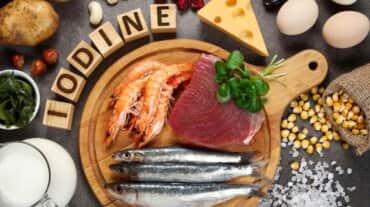Iodine is a crucial trace mineral that the body does not produce on its own, therefore it must be acquired through food or supplements. It occurs naturally in certain foods and is also added to supplements and certain salt seasonings. Iodine plays a vital role in the production of thyroid hormones, specifically thyroxine and triiodothyronine. These hormones are involved in protein synthesis, enzyme activity, and the regulation of normal metabolism.
Some key functions of iodine:
Thyroid Hormone Synthesis:
Iodine is a key component of thyroid hormones, such as thyroxine (T4) and triiodothyronine (T3).
Metabolism Regulation:
Thyroid hormones, influenced by iodine, help regulate the body’s metabolism, including the breakdown of food into energy, the growth and repair of tissues, and the synthesis of proteins.
Growth and Development:
Adequate iodine intake is crucial for normal growth and development, especially during pregnancy and early childhood.
Reproductive Health:
Iodine is necessary for the synthesis of sex hormones, including estrogen and progesterone, which play a vital role in reproductive health and fertility.
Cognitive Function:
Sufficient iodine levels are crucial for optimal brain function and cognitive development.
Maintenance of Healthy Skin and Hair:
Iodine has antimicrobial properties and is often used as a topical antiseptic for disinfecting wounds.
Regulation of Metabolic Balance:
Iodine plays a role in maintaining electrolyte balance in the body and regulating the functioning of cells and organs.
It’s important to note that while iodine is essential for health, both deficiency and excess iodine can have adverse effects on the body.
Here are some common sources of iodine:
Seafood:
Seafood is one of the richest natural sources of iodine. Fish such as cod, tuna, shrimp, and seaweed (kelp) are particularly high in iodine.
Dairy Products:
Milk, yogurt, and cheese are good sources of iodine. Dairy products from cows fed with iodine-rich feed or iodine supplements contain higher levels of iodine.
Eggs:
Eggs are a good source of iodine, especially if they are from chickens fed with iodine-enriched feed.
Iodized Salt:
Iodized salt is a common and widely available source of iodine. It is regular table salt that has been fortified with iodine.
Some Fruits and Vegetables:
Certain fruits and vegetables can contribute to iodine intake, although the levels may vary depending on the soil iodine content. Examples include strawberries, cranberries, potatoes, and some leafy greens.
It’s worth mentioning that the iodine content in food can vary based on the iodine levels in the soil where the plants are grown or the animals are raised.
Here are some key points about iodine deficiency:
Goiter:
One of the most visible signs of iodine deficiency is the enlargement of the thyroid gland, known as a goiter. When the body lacks sufficient iodine, the thyroid gland becomes enlarged in an attempt to produce more thyroid hormones.
Impaired Thyroid Function:
Insufficient iodine levels can lead to reduced production of these hormones, resulting in hypothyroidism. Hypothyroidism can cause a range of symptoms, including fatigue, weight gain, cold intolerance, dry skin, hair loss, and cognitive impairment.
Intellectual and Developmental Impairments:
Iodine deficiency during these critical periods can lead to intellectual disabilities, learning difficulties, and impaired motor skills in children.
Pregnancy Complications:
Iodine deficiency during pregnancy increases the risk of complications, including miscarriage, stillbirth, preterm birth, and developmental abnormalities in the fetus.
Increased Vulnerability to Radiation:
Iodine is important for protecting the thyroid gland from the harmful effects of radiation exposure.
Endemic Goiter and Cretinism:
Severe and prolonged iodine deficiency can result in endemic goiter, a widespread occurrence of goiter in a population, and cretinism, a severe form of mental and physical impairment
Iodine deficiency can be prevented or treated through various strategies, such as iodized salt programs, iodine supplementation, and dietary diversification to include iodine-rich foods.

